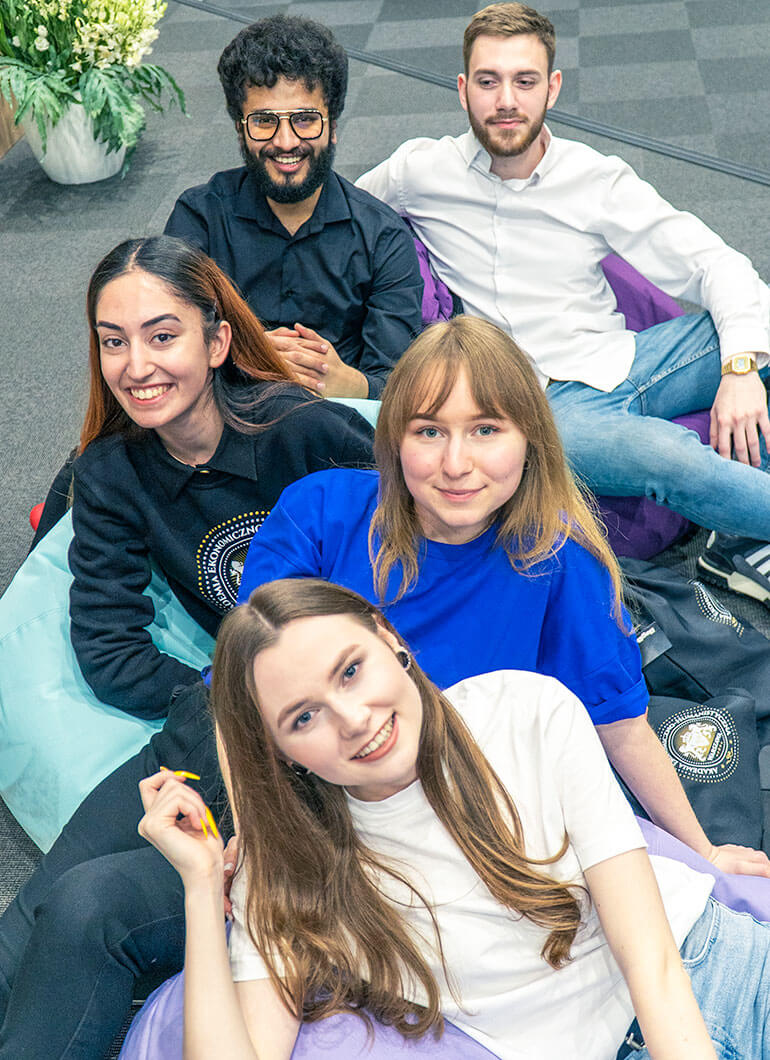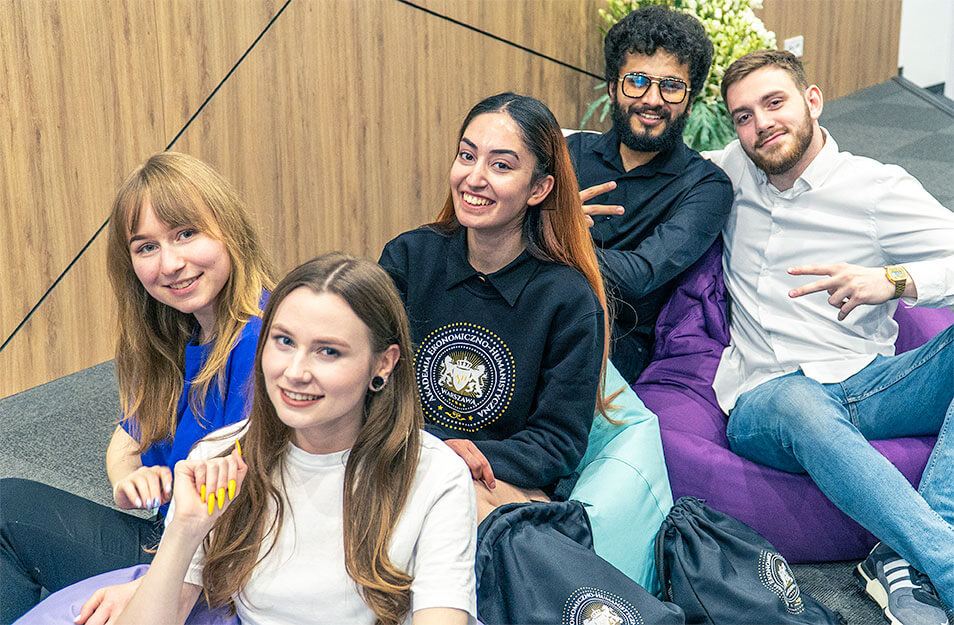Animal therapy
Undergraduate (Bachelor)
Animal behavior and psychology
Why choose this field of study?
Are you fascinated by animal psychology, enjoy observing their behavior and spending time with them? Learn to understand animal emotions and needs at a level that will allow you to turn your passion into a career! Animal behavior and psychology at the VIZJA University is a practical course of study designed for people who want to work every day with animals that accompany humans – dogs, cats, horses, rodents, rabbits or birds – as behaviorists, trainers, responsible breeders or professional caretakers. This is a study that will allow you to gain not only condensed theoretical knowledge, but, above all, practical professional skills, brought by numerous workshops, field exercises and internships that are an integral part of the training.
In the course of your studies, you will explore and learn to put into practice the knowledge of psychology – mainly cognitive and behavioral – as well as zoology and ethology (the science of animal behavior), which will allow you to accurately interpret the behavior and language of animals, solve their behavioral problems, support the processes of socialization, as well as raise and train them based on positive motivation and building bonds with humans. Choosing Animal therapy specialty, you will also gain practical skills in conducting dog therapy and hippotherapy, supporting rehabilitation processes through contact with animals, as well as developing your own business related to animal therapy. You can also choose an alternative specialty in this field of study – see Animal upbringing and training.
Animal behavior and psychology, undergraduate studies – what sets us apart?
- You will learn to understand and interpret animal behavior and language based on in-depth psychological knowledge provided by prominent VIZJA University lecturers.
- You will participate in numerous workshops, as well as observation practices and field exercises at renowned animal care and training centers.
- You will learn about ethical, legal and business issues necessary to conduct business related to your field of study and chosen specialty.
Animal therapy – what can you do after graduation?

After graduating with a specialty in Animal Therapy, you will be prepared for professional activity as a behaviorist and trainer specializing in conducting classes with animals of an educational, recreational, therapeutic or rehabilitative nature. Such classes are used by nurseries, kindergartens and schools, treatment, rehabilitation and care centers, as well as prisons, among others. As an animal therapy specialist, you can – in cooperation with doctors, psychologists or physiotherapists – conduct therapy for people with special needs, including motor and intellectual disabilities, as well as children and adults with psychological or social difficulties. You can also run your own animal therapy center based on the directional and business knowledge you have acquired from your studies.
This program
is for you if:
You are interested in animal behavior and have a developed sense of observation.
You see yourself in a profession that combines working with animals with helping other people.
You are an empathetic, patient and responsible person.



Admission rules and regulations
Note: important information for 2025 candidates
Please read carefully the application procedures in line with the changes introduced by the Polish Ministry of Science and Higher Education in 2025.
Programme and structure of studies
UNDERGRADUATE STUDIES
(BACHELOR’S DEGREE)
Practical studies in Animal behavior and psychology at VIZJA University offer directional knowledge – with an emphasis on the skills workshop necessary for behavioral work with animals. Graduates receive a bachelor’s degree and are fully prepared to develop professional activities.
FIRST YEAR OF STUDY
The first year is dominated by subjects that provide a basis for understanding further directional issues in the area of psychology, zoology or ethology. At this stage, the student also undergoes the first observation practice.
SEMESTER I
| Subject name | Cummulative amount of ECTS points | Cummulative amount of hours (FT/PT) |
|---|---|---|
| Health and Safety | 0 | 8/8 |
| Academic Skills | 1 | 15/8 |
| General Education | 5 | 30/16 |
| Introduction to Philosophy | 5 | 35/20 |
| Introduction to Psychology | 5 | 30/24 |
| Basic Social Communication | 4 | 30/24 |
| Genetics | 4 | 30/16 |
| Zoology | 3 | 30/16 |
| Animal Welfare | 3 | 30/16 |
SEMESTER II
| Subject name | Cummulative amount of ECTS points | Cummulative amount of hours (FT/PT) |
|---|---|---|
| Sports and Recreation | 0 | 30/0 |
| Foreign Language (I) (Elective) | 2 | 30/16 |
| Research Methodology | 4 | 30/16 |
| Emotions and Motivation | 4 | 60/40 |
| Biological Basis of Behavior | 4 | 60/40 |
| Cognitive Processes | 4 | 60/40 |
| Ethology | 4 | 60/40 |
| Animal Anatomy and Physiology | 4 | 60/32 |
| Internship (I) - Observational-Participatory Practice | 4 | 120/120 |
SECOND YEAR OF STUDY
The third and fourth semesters are devoted to deepening directional issues and building practical skills during workshop classes and observational and professional practices.
SEMESTER III
| Subject name | Cummulative amount of ECTS points | Cummulative amount of hours (FT/PT) |
|---|---|---|
| Sports and Recreation | 0 | 30/0 |
| Foreign Language (II) (Elective) | 2 | 30/16 |
| Animal Disease Prevention and Prevention | 5 | 60/32 |
| Dog Behavioral Problems | 3 | 30/16 |
| Animal Breeding | 3 | 30/16 |
| Ethics of Contact with Animals and Human Attitudes Toward Animals | 3 | 30/16 |
| Basic Animal Education and Training | 5 | 60/32 |
| Animal Nutrition | 5 | 35/20 |
| Internship (II) - Observational-Participatory Practice | 4 | 120/120 |
SEMESTER IV
| Subject name | Cummulative amount of ECTS points | Cummulative amount of hours (FT/PT) |
|---|---|---|
| Foreign Language (III) (Elective) | 2 | 30/16 |
| Basics of Psychological Assistance | 5 | 30/16 |
| Quantitative Methods - Statistics | 4 | 60/40 |
| Introduction to Animal Therapy | 4 | 60/32 |
| Comparative Psychology | 3 | 30/16 |
| Pre-Veterinary First Aid | 2 | 15/8 |
| Pre-Medical First Aid | 1 | 15/8 |
| Cats behavioral problems | 2 | 30/16 |
| Horse behavioral problems | 3 | 30/16 |
| Internship (III) (Elective) | 4 | 120/120 |
THIRD YEAR OF STUDY
In the third year, the student mainly pursues subjects in the specialty of Animal therapy, as well as continuing the internship and preparing for the diploma exam.
SEMESTER V
| Subject name | Cummulative amount of ECTS points | Cummulative amount of hours (FT/PT) |
|---|---|---|
| Foreign Language (IV) (elective) | 3 | 30/16 |
| Psychopathology | 4 | 30/24 |
| Legal Protection of Animals | 2 | 30/16 |
| Rodent and Rabbit Behavior | 2 | 15/8 |
| Dog Therapy | 4 | 45/24 |
| Hippotherapy | 3 | 45/24 |
| Animal-Assisted Resocialization | 3 | 30/16 |
| Internship (IV) (Elective) | 6 | 180/180 |
| Project Preparation Methodology | 3 | 30/16 |
SEMESTER VI
| Subject name | Cummulative amount of ECTS points | Cummulative amount of hours (FT/PT) |
|---|---|---|
| Developmental Disorders in Children and Adolescents | 4 | 30/16 |
| Animal Therapy with Selected Animal Species | 4 | 45/24 |
| Use of Animals in Supportive Therapy | 4 | 45/24 |
| Designing Animal-Assisted Therapy | 4 | 45/24 |
| Running a Business Related to Animal Therapy | 3 | 15/8 |
| Internship (V) (Elective) | 6 | 180/180 |
| Social Project | 5 | 60/32 |
The content of the study program may change as a result of efforts to improve the quality of education and adapt the teaching offer to the current challenges of the labor market. Each change is approved by the University Senate and introduced with the aim of preparing students for their future careers in the best possible way.
Tuition fees
Fixed tuition - flexible payments
By choosing to study at VIZJA University, you can be sure that the tuition fee will not change throughout the duration of your studies. You can pay the tuition fee once for the entire year of study or spread over a semester payment. This allows you to decide how you want to plan your expenses.

Fees (academic year 2025/2026)
EU&OTHER COUNTRIES GROUP
| Year of study | Annually | Per semester* |
|---|---|---|
| I | 2800 € | 1550 € |
| II | 2800 € | 1550 € |
| III | 2800 € | 1550 € |
*Semester payment is possible from the second year of studies.
OTHER COUNTRIES
| Year of study | Annually | Per semester* |
|---|---|---|
| I | 3800 € | 2050 € |
| II | 3800 € | 2050 € |
| III | 3800 € | 2050 € |
*Semester payment is possible from the second year of studies.
EU and other countries group
This group includes citizens of the countries member states of the European Union and the following countries citizens: Azerbaijan, Belarus, Bosnia and Herzegovina, Montenegro, Georgia, Kazakhstan, Kosovo, Kyrgyzstan, Latin America, Macedonia, Moldova, Norway, Russia, Serbia, Tajikistan, Turkey, Turkmenistan, Ukraine, Uzbekistan.
Other countries
The citizens of all the remaining countries.
Study in Polish!
Do you want to study at VIZJA University in Polish? It is possible! We have prepared a special program for international students to acquire the skills necessary for active study in Polish and for academic, social and everyday life in Poland.
The Comprehensive Polish Language Program for International Students is:
- part of The VIZJA University Foundation Program, which is a comprehensive preparation for starting regular Bachelor's or Master's studies in Polish at VIZJA University
- a course aimed at two groups of international students: students with knowledge of a Slavic language (Russian, Ukrainian, Czech etc.) and students without prior knowledge of any Slavic language
- a chance for immersion in Polish society and culture, authentic experience of life in Poland and broad career prospects on the Polish labour market
More details coming soon!
Scholarships - easier than you think

While studying at VIZJA University, you can take advantage of a wide range of financial support from the state budget and European funds, as well as benefit from special discounts with VIZJA University discount program
You can submit most scholarship applications quickly and easily through your online account.
In the academic year 2023/2024, VIZJA University awarded 800 Rector’s Scholarships, ranging from PLN 400 /month to PLN 1000 /month, depending on the average or achievements. For outstanding sport, artistic or scientific achievements, the Scholarship Committee awarded scholarships of PLN 600 /month.
Detailed information on the possibility of applying for the Rector’s Scholarship is available in the dean’s system.
A sports scholarship may be awarded to a student who excels in sport achievements at least national level. In addition we also encourage our students to take part in additional support programs- eg. the National Academic Representation.
Young sportsmen can count on financial support in the amount of PLN 600 /month.
Detailed information on the possibility of applying for sports scholarship is available in the dean’s system.
A scholarship for people with disabilities may be awarded to a student who has a disability certificate, a disability degree certificate, a ZUS certifying physician’s certificate, a disability group certificate or a certificate of permanent or long-term incapacity to work on a farm.
In the 2023/2024 academic year, depending on the degree of disability, 350 scholarships for people with disabilities were awarded, ranging from PLN 1700 /month to PLN 1900 /month.
Detailed information on the possibility of applying for a scholarship for people with disabilities is available in the dean’s system.
The allowance is a form of emergency financial assistance. Any student who found himself temporarily in a difficult life situation resulting from random events beyond the student’s control can apply for it.The allowance may be granted twice in one academic year, and the allowance is not granted twice for the same random event.
In 2024, we granted 51 allowances for a total of PLN 255 000. The allowances, depending on the student’s situation, were paid in the amount of PLN 2,000 to PLN 5,000 at a time.
Detailed information on the possibility of applying for the allowance is available in the dean’s system.
2023/2024 academic year
800 Rector’s Scholarships
51 allowances
350 scholarships for people with disabilities
12 500 000 PLN was spent in 2023/2024 on scholarships
PLN 1,890,289.35 was spent in 2019/2020 on scholarships
PLN 2,911,662.50 was spent in 2020/2021 on scholarships
PLN 4,158,177.00 was spent in 2021/2022 on scholarships
PLN 7,829,950.00 was spent in 2022/2023 on scholarships
Rector’s Scholarship – highest average: 5,44





